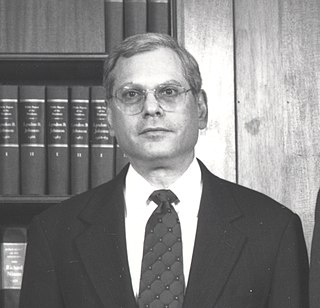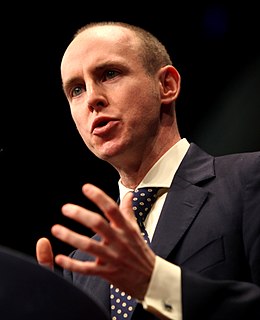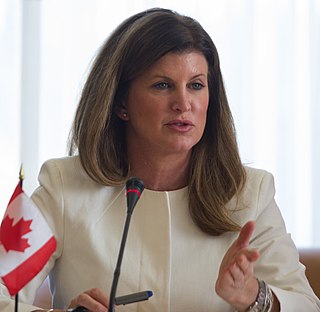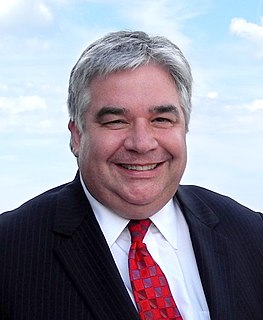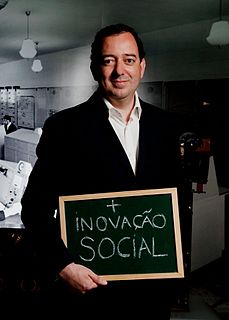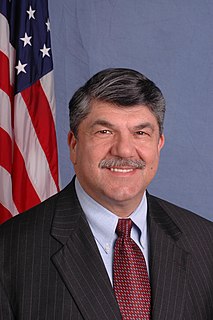Top 1200 World Economy Quotes & Sayings - Page 17
Explore popular World Economy quotes.
Last updated on November 15, 2024.
In pursuing economic growth, India and the United States share similar values and similar challenges. We understand that the global economy is here to stay. To keep growing and leading the world in innovation and opportunity, the United States and India must trade freely, openly, and according to the principles of the global marketplace.
I have always considered Christianity as the strong ground of republicanism. The spirit is opposed, not only to the splendor, but even to the very forms of monarchy, and many of its precepts have for their objects republican liberty and equality as well as simplicity, integrity, and economy in government. It is only necessary for republicanism to ally itself to the Christian religion to overturn all the corrupted political and religious institutions of the world.
Trickle-down economics - it didn't work. The whole idea was supply-side economics: give rich people a lot of money; they'll spend it, it'll go into the economy. Here's what we found out - rich people, really good at keeping all the money. That's how they got rich. If you want it in the economy, give it to the poor people. You know what they're really good at? Spending all their money.
I accept the proposition that there has been a significant improvement in underlying productivity growth in the United States, that it is very closely tied to improvements in information and communications technology, and that it is likely to spread around the world. But I resist the new economy label because it seems to encourage a disrespect for the old rules that could seriously undermine our success in taking advantage of the new opportunities.
I just think, realistically, there's a lot of room outside the Trump populist right and the Bernie-Sanders-Elizabeth-Warren populist left. There are a lot of us who believe in open trade, open borders, a dynamic forward-looking economy, not a nostalgic economy, but do want to provide a significant level of social service or sort of economic Milton Friedman foreign policy, Ronald Reagan domestic policy, Franklin Roosevelt. And there's a lot of room in the center.
We can't afford to waste people. We can't afford to have people think the game is over before it's begun. We've got to be saying to the Canadian people: you can't tax cut your way to a productive 21st-century economy. You can talk that talk, but it's not going to give you a productive 21st-century economy, because it will scythe apart the public goods that make prosperity possible. That's what we've got to say, and so we shall.
We need to deal with three things that are important: first, we need a very deep reconsideration of how we are dealing with the economy. Second, there must be a very deep reconsideration of our way of life. We cannot simply adopt American-style consumer culture. To Islamize that is to de-Islamize Islam.Thirdly, it is important for us to understand the economy and the environment are common challenges for everyone. This is where the singularity of Islamic principles needs to join the universal values that we share with others.
The record-breaking extreme weather events causing chaos across the globe should be a wake-up call. The transition to a low-carbon economy will be much more painful if we wait until there is a climate crisis before recognising that more than half of the world's fossil fuel reserves will have to remain in the ground.
We are going through historic times, and my vision is a world, first of all, in which America continues to be that one indispensable nation. Because we're taking care of our own people, because our economy is strong and our middle class is growing, and people feel like hard work is rewarded, and we are continuing to expand opportunity and diversity and tolerance and respect.
We're foolish if we think we're going to end mass incarceration unless we are willing to deal with the reality that huge percentages of poor people are going to remain jobless, locked out of the mainstream economy, unless and until they have a quality education that prepares them well for the new economy. There has got to be much more collaboration between the two movements and a greater appreciation for the work of the advocates in each community. It's got to be a movement that's about education, not incarceration - about jobs, not jails.
Our economy has become completely different, on the whole. The size has changed. The economy has almost doubled in size. And the quality is changing, not as fast as we would like it to, but the structure is changing. Our Armed Forces are completely different today from what they were, say 15 years ago or so. All of this, including our great history, great culture, all of this, not just what we see today, is what makes the vast majority of Russia's citizens feel proud for their country.
Who was born first, you or the world? As long as you give first place to the world, you are bound by it; once you realize, beyond all trace of doubt, that the world is in you and not you in the world, you are out of it. Of course your body remains in the world and of the world, but you are not deluded by it.
Whenever the debate moves on to hard numbers - our deficit with Europe, our surplus with the rest of the world, our Brussels budget contributions, the tiny part of our economy dependent on sales to the EU, the vast part subjected to EU regulation - Euro-enthusiasts quickly shift their ground and start harrumphing about influence.
Russia does not have a modern economy: it's a petro-power. The only thing it sells that the world wants to buy is oil and natural gas. When was the last time anyone bought a Russian computer? A Russian car? A Russian cell phone? Russia is so dependent on high energy prices that if oil falls below $100 a barrel, the Kremlin can't meet payroll.
The facts are in, the science is beyond question. Sugar in all its forms is the root cause of our obesity epidemic and most of the chronic disease sucking the life out of our citizens and our economy - and, increasingly, the rest of the world. You name it, it’s caused by sugar: heart disease, cancer, dementia, type 2 diabetes, depression, and even acne, infertility and impotence.
If there was an Olympics for misleading, mismanaging and misappropriating, this administration would take the gold. World records for violations of national and international laws. They want another four-year term to continue to alienate our allies, spend our children's inheritance and hollow out our economy. We can't afford another Republican administration.
For 60 years, since World War II, we have been trying to create a rules-based system, a global economic system. We understand that what makes our economy function is what we call the rule of law, and what is true domestically is also true internationally. It is important to have rules by which we govern our relations with other countries.
In my view, the Western model of influencing the development of third world countries is doomed to failure. The West does not understand how to deal with states that no longer have any authority and are threatened by dissolution. Their efforts failed in Iraq as well as Afghanistan. They are simply not capable of promoting the indigenous economy. Many billions of dollars flooded into Afghanistan, but without any significant effect.
One of the challenges over the last decade is America has done experiments in nation building in places like Iraq and Afghanistan and we've neglected, for example, developing our own economy, our own energy sectors, our own education system. And it's very hard for us to project leadership around the world when we're not doing what we need to do.
Nevertheless, it is necessary to remember that a planned economy is not yet socialism. A planned economy as such may be accompanied by the complete enslavement of the individual. The achievement of socialism requires the solution of some extremely difficult socio-political problems: how is it possible, in view of the far-reaching centralisation of political and economic power, to prevent bureaucracy from becoming all-powerful and overweening? How can the rights of the individual be protected and therewith a democratic counterweight to the power of bureaucracy be assured?
A person who undertakes to grow a garden at home, by practices that will preserve rather than exploit the economy of the soil, has his mind precisely against what is wrong with us... What I am saying is that if we apply our minds directly and competently to the needs of the earth, then we will have begun to make fundamental and necessary changes in our minds. We will begin to understand and to mistrust and to change our wasteful economy, which markets not just the produce of earth, but also the earth's ability to produce.
There's no denying that a collapse in stock prices today would pose serious macroeconomic challenges for the United States. Consumer spending would slow, and the U.S. economy would become less of a magnet for foreign investors. Economic growth, which in any case has recently been at unsustainable levels, would decline somewhat. History proves, however, that a smart central bank can protect the economy and the financial sector from the nastier side effects of a stock market collapse.
If a new president personalizes a rather different concept of America and a different sense of America's mission in the world than has been the case with president George W. Bush, then that almost automatically will help to improve America's global image. But the tangibles involving the war and the economy are not going to be easy to fix.
Our government is committed to investing in world-class research networks such as GlycoNet, which will develop new drugs and vaccines to fight diseases that affect millions of Canadians. These investments will improve our quality of life and contribute to the creation of a stronger, more innovative economy and a more prosperous Canada.
The economy in the next 20 to 25 years is going to change more than they did in the last 20, 25 years. And that's because exponential trends are affecting a bigger and bigger share of the economy. So we have some huge disruptions in store, and I can't predict exactly what the innovations are going to be. If I did, I would have already invented them. But I think they'll be comparable to the innovations we saw in the past 20, 25 years if not greater.
The creative process ignites our imagination, and I believe that that same imagination is what will propel us forward with issues of social change. I do think we have to acknowledge that we are a very capitalistic and consumptive nation, and that talk about conservation or issues of sustainability is never going to be popular with the dominant culture because it means checks and balances on an economy that is reserved for the dollar, rather than an economy that honors and respects spiritual resources and the right of all life to participate on the planet, not just our species.
In London - and forget those extra public pressures on politicians - the lovely old Sloane world of manor houses simply hasn't cut it since Big Bang in 1986, the point at which Mrs. Thatcher really started to achieve her ambition to make this country more like America - its ambition, economy, it's very tangible measures of success.
Sustainability is an economic state where the demands placed upon the environment by people and commerce can be met without reducing the capacity of the environment to provide for future generations. It can also be expressed in the simple terms of an economic golden rule for the restorative economy: Leave the world better than you found it, take no more than you need, try not to harm life or the environment, make amends if you do.
So many people have that kind of attitude and approach to learning that it gives me great hope for the world. I say hope in the sense that innovations in science and technology will be the engines of a 21st century economy and I don't want to go broke, as a nation. So, the hope I have is that, if people embrace it, we'll have a healthier, more secure, wealthier nation than we have.
I certainly want people to read what I've written. Yet, and here's that question of economic position, because I have a secure job, I don't need a wide readership to survive. I'm a participant in the indirect economy, what sociological critic Pierre Bourdieu would call the "economic world reversed." I get "paid" by writing whatever I choose. That's a pretty good position to be in, but I don't pretend for a moment that it is not a privileged one.
Simply put, we have to be smart about how we use our power. Not because we have less of it ? indeed, the might of our military, the size of our economy, the influence of our diplomacy, and the creative energy of our people remain unrivaled. No, it's because as the world has changed, so too have the levers of power that can most effectively shape international affairs.
Energy is a sector of the economy that has been particularly resistant to innovation. This is precisely the problem. It is why we are still dependant on energy sources that are 100 to 150 years old while virtually every other sector of the economy has transformed itself. This is why we believe that the faith that many environmentalists still hold that carbon regulations and taxes will drive sufficient private sector investment into energy markets to create the kind of innovation we need is unfounded.
As a city powered by our country's knowledge economy, Toronto will continue to benefit from developing, attracting and retaining the world's most promising young researchers at the University of Toronto. Our government will continue to invest in research awards that lead to long-term social and economic benefits for Canadians.
So we are left with a stark choice: allow climate disruption to change everything about our world, or change pretty much everything about our economy to avoid that fate. But we need to be very clear: because of our decades of collective denial, no gradual, incremental options are now available to us.
Feudalism is an economic system where a few people own all the land and the others have no option but to be serfs on such a feudal estate. We now condemn feudalism. We condemn not merely the feudal lords but we condemn the whole structure of rules that sustained feudalism. I am asking people to think similarly about the world economy.
We may now have reached a point where this gap in our make-up has become unsustainable; partly because what in the past would have counted as material plenty has become the norm for the majority in much of the world; and partly because the slow retreat of religion that coincided with the spread of a capitalist economy has left a gaping hole in millions of people's lives. (Geoff Mulgan)
One of the great sadnesses of modern life, because of our disenfranchisement and disillusionment with religion, is that we don't have access to these ideas. Yoga and meditation, for me, is a way of, in this secular world, accessing very very beautiful principles that would perhaps make us happier, at a time when people feel disillusioned with the economy, concerned about the ecology, worried with politicians, and don't trust what they're being told on television.
Let's just say that if these scientist had been using their brilliance for good instead of evil, cars would run off water vapor and leave fresh compost behind them; no one would be hungry; no one would be ill; all buildings would be earthquake-, bomb-, and flood-proof; and the world's entire economy would have collapsed and been replaced by one based on the value of chocolate.
The world is not something separate from you and me; the world, society, is the relationship that we establish or seek to establish between each other. So you and I are the problem, and not the world, because the world is the projection of ourselves, and to understand the world we must understand ourselves. That world is not separate from us; we are the world, and our problems are the world's problems.
With its array of gadgets and machines, all powered by energies that are destructive of land or air or water, and connected to work, market, school, recreation, etc., by gasoline engines, the modern home is a veritable factory of waste and destruction. It is the mainstay of the economy of money. But within the economies of energy and nature, it is a catastrophe. It takes in the world's goods and converts them into garbage, sewage, and noxious fumes-for none of which have we found a use.
You are not in the world...the world is in you," what did he mean? [That is, you are not in the world," that is, there is no "you" that is real or in any world. "The world is in you" means that the world is in your "mind" and is nothing more than a figment of your programming-and-conditioning-induced imaginings.]
While we have put an utmost emphasis on Gross Domestic Products (GDP) as a barometer for the overall economy until now, we have not paid much attention in detecting a level of social welfare. We, as a member of the society, must now take steps to create an index to indicate other critical elements to be focused on in order to restore reliability of world statistics.
Let me just try to give you sort of the intuitive one here on the stimulus funds. If you have a two-person economy - let's imagine we have two farms, and that's the whole world, just two farms. If one of those farmers gets unemployment benefits, who do you think pays for him? Am I going way over your heads today?
I wouldn't necessarily assume that because Capricornia has traditionally been a Labor seat, that it'll go back to the Labor Party this time because the big issue in Capricornia which is based on the city of Rockhampton is the fact that the economy is - the regional economy is in a poor shape as a result, in particular of the decline of the mining industry and they are looking to the Carmichael mine, the Adani project as containing all of the prospects that they see for their future and that is why people in Rockhampton are very, very fearful of a Labor-Greens government.
Our practical choice is not between a tax-cut deficit and a budgetary surplus. It is between two kinds of deficits: a chronic deficit of inertia, as the unwanted result of inadequate revenues and a restricted economy; or a temporary deficit of transition, resulting from a tax cut designed to boost the economy, increase tax revenues, and achieve -- and I believe this can be done -- a budget surplus. The first type of deficit is a sign of waste and weakness; the second reflects an investment in the future.
Socialist economy cannot reject the huge advantages of the world division of labor: on the contrary, it will carry it to the highest development. But in practise, it is not a question of the future socialist society, with an established internal equilibrium, but of the given technically and culturally backward country which in the interests of industrialisation and collectivization is forced to export as much as possible in order to import as much as possible.
As the United States continues its slow but steady recovery from the depths of the financial crisis, nobody actually wants a massive austerity package to shock the economy back into recession, and so the odds have always been high that the game of budgetary chicken will stop short of disaster. Looming past the cliff, however, is a deep chasm that poses a much greater challenge -- the retooling of the country's economy, society, and government necessary for the United States to perform effectively in the twenty-first century.
In the eighties and nineties, the innovation agenda was exclusively focused on enterprises. There was a time in which economic and social issues were seen as separate. Economy was producing wealth, society was spending. In the 21st century economy, this is not true anymore. Sectors like health, social services and education have a tendency to grow, in GDP percentage as well as in creating employment, whereas other industries are decreasing. In the long term, an innovation in social services or education will be as important as an innovation in the pharmaceutical or aerospatial industry.
Especially now, the immigrant problem is very dramatic around the world. Because we don't know what to do with them. They're in economic crisis, and there are more and more. There will be more and more. We speak about globalization of economy, but it's also globalization for immigration. Millions of people, they're willing to have a better life. A better life, they cannot have it where they live, so they move.
We're the only developed country in the world that doesn't have paid maternity leave. Paternity leave is just as important. Paid family medical leave so that you can take care of a parent, a child, a grandparent, whatever you need to do. I think we're shortsighted when we don't invest in our employees as companies, and as an economy, because we invest in them and they invest back in us.
What do the 5%, or the 1% actually use their money for? They lend it back to the economy at large, they load it down with debt. They make their money by lending to the bottom 95%, or the bottom 99%. When you give them more after-tax income, it enables them to buy even more control of government, even more control of election campaigns. They're not going to spend this money back into the goods-and-services economy.
We now live in a world where the most valuable skill you can sell is knowledge. Revolutions in technology and communication have created an entire economy of high-tech, high-wage jobs that can be located anywhere there's an internet connection. And today, a child in Chicago is not only competing for jobs with one in Boston, but thousands more in Bangalore and Beijing who are being educated longer and better than ever before.
An economy cannot long remain prosperous by government's taxing and spending more, now absorbing national output at a rate equal to the entire income of every American living west of the Mississippi. If this trend continues, America will gradually sink into the status of a Third World nation - more unemployment, more shackles on production, more poverty.
My stories usually begin with the characters and some elements of how power (personal, political, magical) functions in the world. The rest develops as I write, and research helps a great deal with that. If you're going to write about an agrarian economy, research agrarian economies. If your main character is starving, then you should know what it means for a malnourished body to break down.



